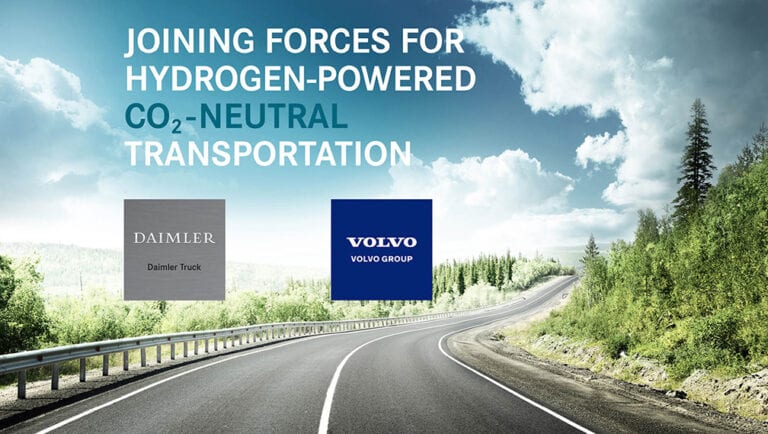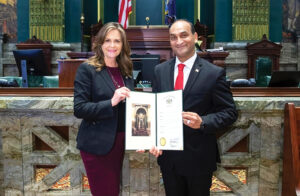GOTHENBURG, Sweden, and STUTTGART, Germany — Daimler Truck AG and the Volvo Group completed the formation of a fuel-cell joint venture, dubbed “cellcentric,” on March 1.
The joint venture was designed to develop fuel-cell systems for use in heavy-duty trucks. Both companies’ goals are to begin customer tests of trucks with fuel cells in three years, with series production during 2025.
The ambition is to make the new joint venture a leading global manufacturer of fuel cells, and help the world take a major step towards climate-neutral and sustainable transportation by 2050.
“The common goal is for both companies to offer heavy-duty vehicles with fuel cells for long distance freight transport in series production in the second half of this decade,” said Claes Elliasson, senior vice president of media relations for the Volvo Group. “We believe that fuel cells will be one important solution in order to meet the EU CO2 target for 2030 and could also play an important role in other parts of the world. One key condition will be the availability of hydrogen infrastructure. In addition, EU-wide standardization and hydrogen infrastructure will be needed in order to fully capture the opportunity of carbon neutral transportation using hydrogen.”
Eliasson said hydrogen fuel cells will be an “attractive solution” for powering electric trucks to carry heavy loads and in long-haul applications. In addition to trucks, the fuel-cell system may be applied to other products.
The joint venture will develop a system with several power stages, including a twin system with 300 kilowatt continuous power for heavy-duty long-haul trucks.
Based on demand in heavy-duty truck applications, the products are suitable for uses such as stationary power generation.
“For us at Daimler Truck AG and our intended partner, the Volvo Group, the hydrogen-based fuel-cell is a key technology for enabling CO2-neutral transportation in the future,” said Martin Daum, chairman of the board of management for Daimler Truck AG, in a November statement. “We are both fully committed to the Paris Climate Agreement for decarbonizing road transport and other areas, and to building a prosperous jointly held company that will deliver large volumes of fuel-cell systems.”
Daimler Truck AG and the Volvo Group have agreed to name the company cellcentric GmbH & Co. KG.
The Volvo Group has acquired 50% of the partnership interests in the existing Daimler Truck Fuel Cell GmbH & Co. KG for approximately 6.3 billion in Swedish krona ($740,889,450) on a cash and debt-free basis.
The Volvo Group and Daimler Truck AG own equal interests in the joint venture, but continue to be competitors in all other areas such as vehicle technology and fuel-cell integration in trucks.
Following a presentation on electrification in its vehicles to the Paris Climate Protection Convention, Daimler Truck AG signed a binding agreement with the Volvo Group in November 2020.
“In the future, the world will be powered by a combination of battery-electric and fuel-cell electric vehicles, along with other renewable fuels to some extent,” said Martin Lundstedt, President and CEO of the Volvo Group, in a November statement. “The formation of our fuel-cell joint venture is an important step in shaping a world we want to live in.”
In addition to the fuel-cell venture, Daimler Truck AG and the Volvo Group partnered with Industrial Vehicles Corp., OMV and Shell to create hydrogen trucks in Europe. The goal is to achieve zero net emissions in Europe by 2050.
The Volvo Group and Daimler Truck AG share the European Union’s Green Deal vision of a carbon natural Europe by 2050, according to Eliasson.
“Transport and logistics keep the world moving, and the need for transport will continue to grow,” Daum said. “Truly CO2-neutral transport can be accomplished through electric drive trains with energy coming either from batteries or by converting hydrogen on board into electricity. For trucks to cope with heavy loads and long distances, fuel cells are one important answer — and a technology where Daimler has built up significant expertise through its Mercedes-Benz fuel cell unit over the last two decades.”
Hannah Butler is a lover of interesting people, places, photos and the written word. Butler is a former community newspaper reporter and editor for Arkansas Tech University’s student newspaper. Butler is currently finishing up her undergraduate print journalism degree and hopes to pursue higher education. Her work has been featured in at least nine different publications.








